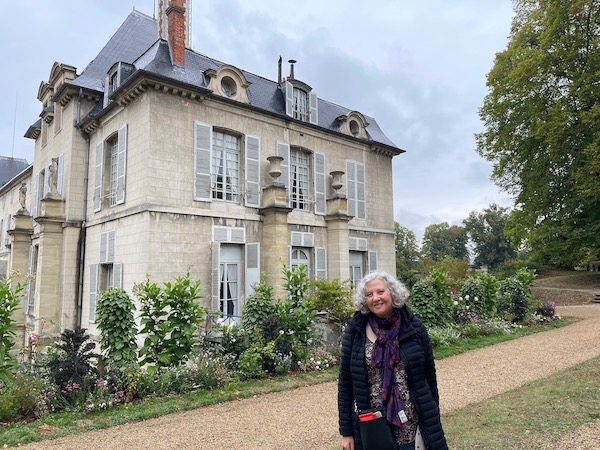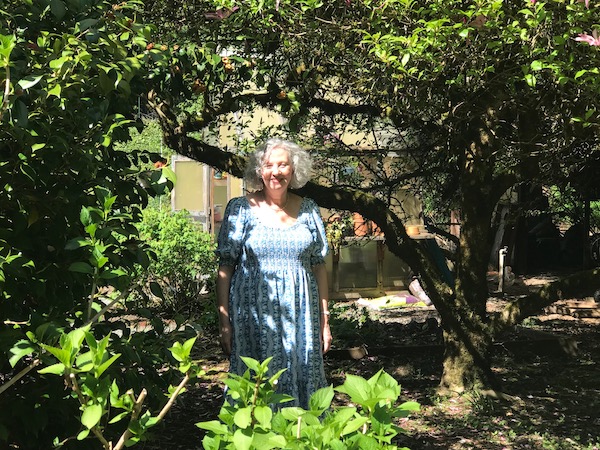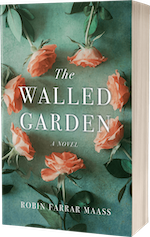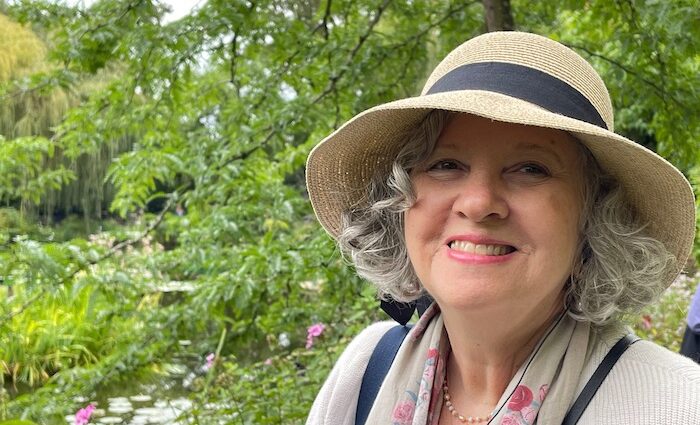The biggest emotional challenge for me has been self-doubt.
It took me SO LONG to give myself permission to write the book of my heart.
I have been in love with words and the effects of words all my life. Every book I’ve ever loved made me want to create that kind of reading experience for other readers.
When I was 22, I went to England for the first time and fell completely in love with it, and all I could think was that I wanted to write a novel set there. Then I came home, got a job in a bank in downtown Seattle, married my high school sweetheart, and spent years working on a mystery novel set in a bank in downtown Seattle.
Oh, and had two children!
I Couldn’t Focus On Writing While I Was Raising My Kids
Multi-tasking is highly valued skill in our culture, and it took me years to realize that I can’t do it. I couldn’t focus on writing while I was raising my kids. (I really admire women who can.)
I did lots of things during those years to try to keep my dream of writing alive, mostly involving newsletters. I wrote—and in some cases founded—the newsletters at my kids’ preschool, elementary and middle schools, as well as our neighborhood association, the Northwest Horticultural Society, and probably some others I’ve forgotten now.
But that kind of writing did not fill my heart.
Another of my more successful sublimations of my desire to write was taking up watercolor painting. I was able to indulge my love of color, and though I showed and sold my work and even taught watercolor classes in my garden, it wasn’t enough.
I still wanted to write a novel set in England.
It Took Me 10 Years After I Graduated to Finish My Novel
So, after my daughter left for college, I went to my first writer’s conference with the very rough draft of a story I’d been working on off and on for years. The three main characters had come to me years earlier in a dream: a young American woman, an older English gentleman, and a young British guy. I had started writing about them, trying to figure out who they were.
The young woman eventually became Lucy Silver. I’ve always been drawn to stories of young women setting out to make their way in the world, like me at 22, naïve and hopeful, and both well-educated and completely ignorant at the same time. The old English gentleman became Sir Edmund de Lisle, an elderly aristocrat with a secret he’d kept all his life.
The young British guy went through multiple iterations and finally became Sam McKenna, a contractor. He was definitely the hardest one to figure out!
Having survived the panic attack of my first workshop experience led me on to a year-long fiction-writing course at the University of Washington Extension, and eventually to an MFA. I’d hoped to graduate from my MFA program with a completed draft of what was then called Garden Dreams, but I had to rewrite the novel’s problematical beginning.
It took me another ten years after I graduated to finish and polish what became The Walled Garden and finally start querying agents.

I Almost Gave Up Writing Multiple Times
I almost gave up multiple times in those years—there was no guarantee the book would ever be published and I questioned my sanity at times for continuing to pursue a dream that seemed so impossible.
But I knew I wouldn’t be happy with myself if I got to the end of my life and I hadn’t written and published my novel.
Lots of rejections and near misses later, and after I’d dramatically announced to my family that the book was dead, I decided to query SparkPress—and they accepted me.
I’ve Asked God Many Times If I Should Continue On This Writing Path
I’ve taken classes, and read lots of books on writing and the creative life. I’m a Christian, so I have a consistent prayer practice. I’ve asked God many times whether I should continue on this writing path, and I always seem to get back some encouragement just when I need it most. Tears have been shed too, during low moments or after especially heartbreaking rejections.
One thing that helps me a lot is having a standing weekly writing date with my friend, Sue, who’s working on a memoir. There’s something about writing together in the same room that makes writing feel more doable and less lonely. We’ve gone on writers’ retreats to her cabin in the mountains, and traveled to England together so I could gather ideas and inspiration for my novel.
Another thing that helps me is being out in my messy wants-to-be-an English garden. As well as directly inspiring my writing, I find spending time there a balm to my soul, whether I’m weeding and planting or just lying in my lounge reading and drinking tea.
I’m obsessed with flowers, especially scented ones. My heart belongs to flowers like roses, sweet peas, lilies of the valley, and lilacs. Rubbing and smelling the leaves of chamomile, mint, lavender, and rose- and lemon-scented geraniums helps calm and ground me.
Every now and then, I try to grow vegetables but they never seem to thrive for me—I suspect they know I don’t really love them! So I focus on herbs and edible flowers, and occasionally I get a handful of strawberries.
When It Comes to Exercise, I’m Too Good at Procrastinating!
Inside, I experiment with essential oils in a diffuser, mostly during the winter when it’s hard to get scented flowers. I like to walk, though I hate admitting I’m a fair-weather walker at best, especially during our long, rainy NW winters. I wish I was more disciplined.
We have a treadmill, but I find it so boring most of the time, I can’t make myself get on it. My twice-a-week workout with a trainer fell apart during the pandemic, and somehow, I haven’t been able to get back on track with that. I don’t naturally love going to the gym, so that’s a problem too.
Painting watercolors or drawing helps get me out of my “word-brain” into a different creative space. I do yoga stretches at night, but I need to find a yoga class and commit to it. Unfortunately, when it comes to exercise, I am all too good at procrastinating!
How My Writing Coach Helps Me
The best thing I’ve ever done for my writing life (post MFA) is to hire a writing coach. I send her the pages I’ve produced once a month, and then we talk for an hour on the phone. There are so many ways to go down the wrong path when you’re writing a novel, and hearing her impressions helps me stay productive and on track.
The main thing my MFA helped me realize is that I need accountability and deadlines. Since I don’t like feeling that I’ve let people down, knowing I have a deadline motivates me to come up with something—even if it’s not my best work.
I’ve been amazed at how many times a comment or question from her will lead me on to something I could feel but not articulate yet—or even something I hadn’t seen before! I always get off the phone after our conversations feeling energized and excited to write again.

Writers and Back Pain
[Biggest physical challenge:] The many, many hours you have to spend with your butt in a chair!
Like all writers (I imagine), I have ongoing neck and low back pain. I have a standing massage appointment every other week, which helps a lot—I’m not sure how I would be able to keep writing without it!
I’ve done physical therapy several times for help with managing neck and back pain and also to rehab from injuries. I broke my right wrist in 2017, which was terrifying since I’m right-handed, so for a while, I was a writer who literally couldn’t write!
Fortunately, I had good medical and post-surgery rehabilitation care, and I fully regained the use of it. My wrist still aches and bothers me at times but massage helps a lot, and also arnica and other pain relief creams.
I Keep Experimenting with Writing and Wellness
Healthwise, I’m always trying to balance a bunch of different things: the need to make progress on my new novel, the need to physically move my body, the need to keep my core and upper body strong (failing at that right now, I’m afraid), and of course, trying not to gain weight.
I don’t believe in deprivation or diets—telling myself I can’t have something just makes me want it more, so mostly I try to eat smaller portions of foods I like. It would probably be better if there were more kale, etc. on that list and less pasta, but that’s the way it is!
I definitely have a sweet tooth too—my reward to myself after a day of writing is afternoon tea, served in a pretty teapot with a cookie or scone alongside. I find the ritual of making it as important as the food. And it’s also a way to delineate my “work” day from my relaxation time.
Fortunately, I’ve been able to maintain my weight within about a four-pound range. In general, I just keep experimenting and trying to make it all work out.
Anything You Can Do To Spread the Word About Your Books Helps
[Best book marketing tactics?] I’m not sure I know the answer to that yet.
The book got some good reviews, and was featured on some Spring 2022 reading lists. The publicists sent it out on a Bookstagram tour and I enjoyed seeing it reviewed on IG. The publicists also got me multiple guest post opportunities and signings with two different Barnes & Noble stores in my area.
I advertised twice with Foreword Reviews (which I think may have helped library sales). My publicist also got me several radio/podcast interviews around the time the book came out (May 2022). I recently did an interview for Hear Us Roar, the Women’s Fiction Writers’ Association podcast.
I also just finished a Bookbub international featured deal promotion (which came to me via SparkPress), and I’m interested to see the results from that.
Instagram is the social media outlet I like best, though I’m a very inconsistent post-er. (Still struggling with that self-promotion thing.)
I’ve discovered I really enjoy speaking to book groups. It’s so fun to hear people’s questions and to talk to people who have actually read this thing you’ve spent so much time working on!
I think pretty much anything you do to get the word out about your book helps. I’m not sure anyone actually knows what makes people buy books. I’m coming to believe that it’s a slow, organic, word of mouth process that, as much as we all love instant success, just takes time.
Balancing Solitary Time for Writing with Time for Going Out
I don’t work outside my home, so I’m free to combine writing with the other things going on in my life—socializing with friends, volunteer work, gardening, family life, housework, appointments, errands etc.
I find I have to stay aware of how I balance the solitary time I need for writing with time for going out and seeing people. On the days I don’t want to leave my desk, I remind myself that I want to still have friends when my next book comes out!
I don’t have a set-in-stone routine, but I like to get to my desk in the morning, right after breakfast, go through my email, and get on to the scene or chapter I’m currently working on. I take a break for lunch and maybe some garden time or errands in the middle of the day, then go back to my desk in the afternoon.
I find I’m not usually as productive in the afternoons as I am in the mornings. I’m more easily distracted—and prone to start scrolling Bookstagram!
My Experience Working with a Hybrid Publisher
I’d hoped to get an agent and be published by one of the mainline publishers, but after three years of querying and too many rejections, I was done. I knew I didn’t want to self-publish because the whole book promotion and distribution piece is so challenging. As an introvert, I knew I didn’t have it in me to drive around to bookstores with a carton of books in the back of my car, trying to persuade people to carry my book!
I felt that publishing with SparkPress gave me three big advantages (over self-publishing).
The first is that the book would actually be published and would have editorial and design guidance in the process.
The second is that SP offers distribution with Ingram Publisher Services (now called Publishers Group West), which means that my book would be available to order everywhere from Amazon to retailers like Barnes & Noble and Target, to independent bookstores—basically anywhere books are sold.
That’s huge, because it means people can get the physical book, the ebook, and the audiobook without having to go through me. It also makes bookstores much more willing to carry your book, because they can order it through their usual distribution pipeline.
The third thing that was important to me was professional cover design.
I wanted the most high-quality cover I could get, and SP was great to work with in that regard. They gave me lots of input into the cover design process, which I’m grateful for because The Walled Garden features a code in the Language of Flowers, which is a Victorian system of assigning meanings to flowers and plants. So, it was important to me that the flowers on the cover have “good” meanings in the Language of Flowers.
I worried that this would make me sound annoying and picky, but they totally got it. I’m so pleased with the cover—the roses are similar to an important rose in the novel which means, “If you love me, you will find it out”—and their arrangement suggests the idea of enclosure.
The major con in going with a hybrid press is: the money.
It is not cheap by any means. I’m blessed that my husband was willing to back me to finance my dream—it almost feels like you’re becoming a small business owner.
In addition to paying SparkPress’s upfront fee, the author also pays for their own print run. There were also several rounds of edits I was also charged for, as well as shipping (amazingly expensive) and related costs.
The biggest cost of all, though, was promotion. I paid almost twice as much for the publicity campaign as I did for the publishing package. Occasionally, I despair over how much it all cost and whether I’ll ever make my investment back and I have to tell myself that at least the book is out there and it’s gradually finding its readers, and that’s a slow, organic process.
So, not an overnight bestseller, but I try to live in hope!
Advice for a Young Writer: Start Sooner!
Start sooner! Even though I wrote a mystery novel in my 20s-30s, I wish I’d had the courage to take myself seriously as a writer before I turned 50.
It took me such a long time to give myself permission to write what I really wanted to write. Julia Cameron’s books The Artist’s Way and The Right to Write were a huge help to me during this long process. I’m not sure I would have made it as a writer without them.
It sounds faintly heretical to say that I eventually stopped writing morning pages because I felt they were taking too much of the energy and “juice” away from my fiction-writing. Still, they were a step in the process.
Stay Stubborn and Don’t Give Up!
Growing up in a small town in the 1970s, I took in a lot of messages about women could and couldn’t do in the world. Women of my era weren’t conditioned to believe it was “worth it” to invest in themselves, and investing in hybrid publishing to get my novel out into the world was a big internal struggle for me.
One of the things I’ve struggled with most is the deeply ingrained feeling from my childhood that it’s wrong to call attention to my own accomplishments. When you’re trying to promote a book, that’s a serious obstacle to be up against!
If I had any words of wisdom to give anyone about writing, I’d say that if that’s your calling, then you have to follow it. Because, despite all the struggle and heartbreak, it’s still worth it to find the thing you really want to say, and to work on your craft till you find your way of saying it.
Toni Morrison said, “If you find a book you really want to read but it hasn’t been written yet, then you must write it.”
As much as anything, that sums up my journey with The Walled Garden. There was something inside me that wouldn’t let me rest until I’d gotten these characters I love and their story out into the world. So maybe my best advice is: stay stubborn and don’t give up!
* * *
Robin Farrar Maass is a lifelong writer and reader who grew up in western Washington and fell in love with England on her first trip when she was twenty-two. She enjoys tending her messy wants-to-be-an English garden, painting watercolors, and traveling.
The Walled Garden is her first novel, and she’s already at work on her next novel set in England. She has an MFA from the Rainier Writing Workshop at Pacific Lutheran University, and lives in Redmond, Washington with her husband and two highly opinionated Siamese cats.
For more on Robin and her work, please see her website and connect with her on Instagram and Twitter.
 The Walled Garden: American grad student Lucy Silver arrives in England hoping to solve a longstanding literary mystery, write her dissertation, and finish her graduate studies in a blaze of academic glory.
The Walled Garden: American grad student Lucy Silver arrives in England hoping to solve a longstanding literary mystery, write her dissertation, and finish her graduate studies in a blaze of academic glory.
But as Lucy starts to piece together the correspondence between her late grandmother and Elizabeth Blackspear, the famous poet and garden writer who’s the subject of Lucy’s dissertation, she discovers puzzling coded references in the letters—and when an elderly English aristocrat with a secret connection to Elizabeth offers Lucy access to a neglected walled garden on his estate, the mystery deepens.
As spring turns to summer in Bolton Lacey, Lucy finds herself fighting the Blackspear Gardens’ director’s attempt to deny her access to vital documents in the archives . . . and trying not to fall in love with an attractive Scottish contractor.
In the midst of this turmoil, she stumbles upon an illicit plot to turn the historic gardens into a theme park, and becomes determined to stop it. As she races against time to save the gardens, Lucy’s search for the truth about Elizabeth’s life leads her to a French convent where she uncovers explosive evidence that will change her life and the lives of everyone around her, ultimately revealing a home—and an inheritance—more incredible than anything she could ever have imagined.
Available at Amazon and wherever books are sold.

